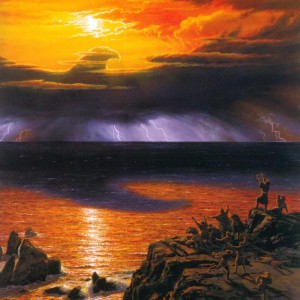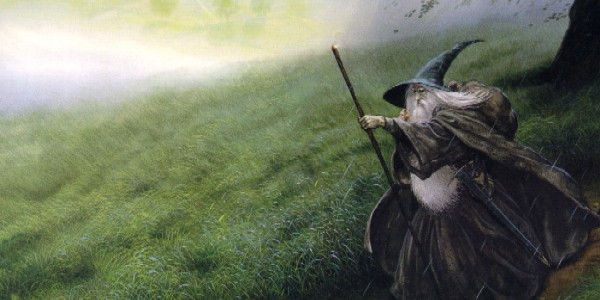It is the timeless theme of an absolute Good versus an absolute Evil, a struggle playing out both cosmically and terrestrially. Unequivocally, Gandalf plays a major role in this fight. The consciousness behind his role is, maybe, one spot of contention. Tolkien, as subcreator of Middle-earth, imbued his mythology with a full span of themes, emotions, and motifs to lay the foundation for the ultimate existential struggle that constitutes the bulk of his stories. He consciously chose to include the Evil, the bad and wicked sides that motivate people to great action and make great tales. But he was a firm believer in the Good.
 We come now to the more psychological, or psychoanalytic, notion of Tolkien’s attachment to his world. For someone as devoted to his creation as Tolkien — who, it may seem, was primed to write and create as he did even from his youth — it should come as no surprise that great attachment and emotional involvement with the peoples, places, and traditions would ensue.
We come now to the more psychological, or psychoanalytic, notion of Tolkien’s attachment to his world. For someone as devoted to his creation as Tolkien — who, it may seem, was primed to write and create as he did even from his youth — it should come as no surprise that great attachment and emotional involvement with the peoples, places, and traditions would ensue.
The struggle between authors and the filmmaking establishment is another showcase of the true emotions creators feel for their works; but, even those of us who write or craft things on our own feel the same passion. This is inherent in any personal craft. The difference with authors as opposed to other artists lies in the narrative form of their work.
Authors, thus, can see to the manifestation of their desires — and thanks to the medium of literature, they can make it seem as though this desire was a naturally-occurring event or plot point. What I mean to say is this: because Tolkien wanted the Good to triumph over Evil, he ensured that it did. And he did so by means of Gandalf, who does succeed in his task (though Tolkien, master that he was, wove Gandalf’s role seamlessly into the narrative). In this way, Gandalf truly is the “voluntas creatoris.”
Some of you will ask after the intention behind all this. My answer is that it does not matter, per se. If Tolkien consciously thought to develop Gandalf’s character from the beginning in this way, or whether he assumed this “de facto” role finally, does not really make a difference.
What matters is that Gandalf always happens to guess at more than we can, to be in the right place at the right time, and generally to be one step ahead. Gandalf’s goal is the same as Tolkien’s — this is not mere coincidence, especially in light of Gandalf’s task being given him by another unquestioning, high authority, Manwe.
None of this is meant to demean Gandalf’s role; on the contrary, I am writing this to highlight his true importance, as we do not often see it. We often associate hobbits with the Professor, self-proclaimed one as he may be. But although Tolkien may not have seen himself as a perpetual wanderer, never knowing where the next meal may come from or when he next will sleep, he shares a fundamental similarity of mind and spirit with Gandalf.
Tolkien may have wanted the “little people” to be the ones to change the course of the world, but it is (literally) Gandalf that shoves them out the door to their task.
As such, we should direct some of the attention we throw at hobbits — the “finestest” though they be — in favor of Gandalf who, much more than we realize, has a special connection to Tolkien. Recognizing the “voluntas creatoris” relationship between Gandalf and the Professor, perhaps upon rereading and reexamining the texts, we will find more of the Professors true thoughts and musings as manifest in the wisdom of this wizard.
After all, remember what he says to Bilbo at the end of The Hobbit: “You don’t really suppose, do you, that all your adventures and escapes were managed by mere luck, just for your sole benefit?”.
Tedoras is a bibliophile, linguist, and regular attendee at TORn’s live weekly webcast. He splits his time between scouring the web for Tolkien books to add to his collection and the study of Chinese politics and public policy.



